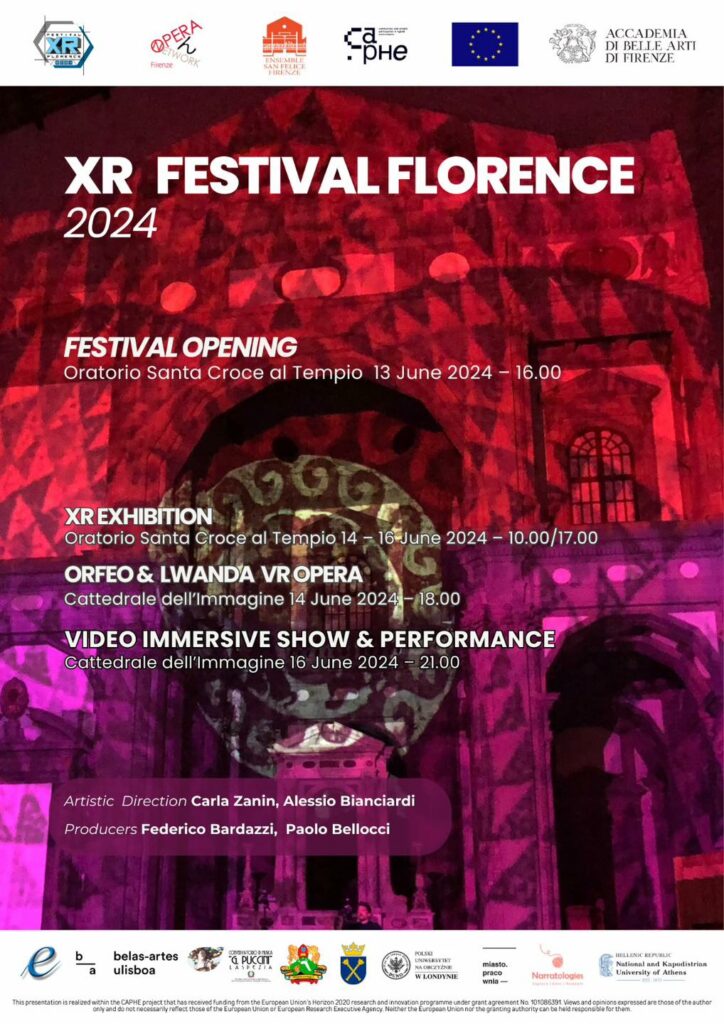In the heart of Florence, the XR Festival by CAPHE, concept and organization Opera Network, will explore the relationship between XR technologies and the architectural and artistic spaces. Numerical nature of design has been present in artistic thought and creation from the time of the ancient Grand Theory of Beauty, through the Renaissance with the prominent Florentines, such as Brunelleschi, who based their design on arithmetics and algebra alongside geometry. Renaissance thought in the sciences and the humanities were indeed intertwined, and beauty manifested before man was apprehended as an epiphenomenon of number. In 1436, on the consecration of the Brunelleschi’s Dome, the famous Flemish musician G. Dufay composed the motet “Nuper rosarum flores”, whose composition reproduced the numerical relationships present in the Dome, and they were linked to the golden section. The current debate on art and digital transformation raises questions about the virtual and physical realms. Through an interdisciplinary approach in music, architecture, video art, game design, and philosophy, the aim of the Festival is to try to expand the classical concept of space and artistic expression. XR can become a new level of physical architecture, experimenting with an ‘expanded world’ and opening up to new aesthetics and unexpected implications. International artists and researchers collaborating in the European Horizon project CAPHE (Communities and Artistic Participation in Hybrid Environment) will join forces in defining the boundaries space between the physical and the virtual, creating a “new” space beyond their separation, as part of the XR Festival. They will experiment with forms, integrating them in a new hybrid way using VR and AR technologies, also for educational purposes in different specialties.
Carla Zanin – Artistic Director
Aleksandra Lukaszewicz – Numerical Art Curator
Inside the XR Festival
Three main events will be carried out, as three different prototypes of experimentation in the field of immersive and XR technologies applied to performing arts and they will represent a significant milestone in the intersection of art, technology, and immersive performance, serving as an open platform to explore the limitless and potentiality of XR in transforming artistic and aesthetic expression and storytelling.
XR Art Exhibitions: a hybrid-physical exhibition curated by Aleksandra Łukaszewicz from the Polish Society for Aesthetics titled “Numerical Art. Fractality of the Universe” and a virtual exhibition at the GALERIA KONKRET AR.T on the Spatial.io platform curated by Helena Elias and José Revez from Faculty of Fine Arts at the University in Lisbon titled “Ethereal Gesture”. Both exhibitions are elements of Numerical Art and will be accompanied by a show by Virtual Sculpture students from the University of Lisbon. The hybrid artwork titled “Mukuru Tales” by Miastopracownia from Poland and an Art XR Tour by Narratologies from Greece are included in the Exhibition.
Hybrid Opera: a special event will be the hybrid performance Orfeo & Lwanda, in collaboration with Ensemble San Felice and Academy of Art in Szczecin, which will include an experimental VR Experience Opera room with the stage direction of Carla Zanin. Incorporating music by the conductor Federico Bardazzi with vocal soloists, two choirs, midi and physical instruments, immersive sound and video scenography, dance, and Rokoko smartsuite technology. The Italian tenor Leonardo De Lisi will play Orfeo physically, while the Kenyan singer Priscilla Gitonga will perform Lwanda African hero physically and also virtually on spatial.io platform, with the use of immersive video projection and the virtual onto the physical in the process of the transformation of common myths legends that connect humans transculturally on the level of archetypes. The performance will be the final effect of the participatory CAPHE research on the creative process in hybrid environments also with the use of AI tools managed by the fashion designer Anna Syczewska – focused on scenography, costumes, and performative aspects of avatars presence. It will allow us to redefine not only myths, legends, roles, and functions, but also categories of representation and presentation. The immersive video, by Carla Zanin, is the result of an integration of different artworks by Alessio Bianciardi, David Tozzi, the Kenyatta University students, and Narratologies from Athens. In the context of the research and dissemination activities relating to the virtual audience, the Jagiellonian University from Krakow will carry out the experimental live streaming of the event in the VR Space of Academia Electronica on the platform Spatial.io.
Video Immersive Show & Performance: a Video Immersive event will be held during a full evening dedicated to celebrating Video Art in all its diverse forms, encompassing traditional video art, immersive experiences, video games, ventures into the metaverse, and more, in a wide range of styles, techniques and thematic explorations. The event serves as a hub for collaboration between artists, technologists, and researchers in different fields, fostering interdisciplinary dialogue and innovation. The event will be the result of a call open to artists, researchers, professionals, and students in cinema, animation, digital arts, graphic design, video games, etc. The theme is open, allowing participants to explore the relationship between the physical and virtual realms, technologies and new aesthetics, tradition and innovation and experimentations engaging the Metaverse. In collaboration with Pietro Marra and the students of the Fine Arts Academy of Florence, and Monica Mendes and the students of the Faculty of Fine Arts of Lisbon University. In the context of the video immersive evening, two special live performances will be held: Medinitaly by Roberto Malfagia, VR Meditation with Oculus, an immersive Mindfulness session in typical Italian landscapes enhanced by skillful use of spatialized ambisonics sound and a personalized sound design – reservation is required.
Bodyscaping – Dynamics for the Body by Massimo Bevilacqua, is a work that mixes performance, video installation, and sound design, experimenting with the use of interactive technologies to create a dramaturgical score in which the body acts to reinterpret urban and natural landscapes.
In the weeks leading to the three main events, at Fine Arts Academy of Florence and at Opera Network seat (via Jacopo da Diacceto, 3/b Firenze) interactive workshops and lectures will be held, according to this calendar https://tinyurl.com/caphe-cal

